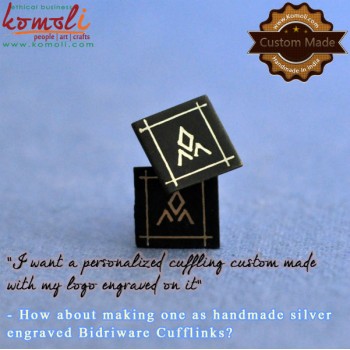Bidriware

The origin of Bidriware is usually attributed to the Bahamani sultans who ruled Bidar, now in the state of Karnataka, India during the 13th–15th centuries. Abdullah Bin Kaiser, a craftsman from Iran was invited by the Sultan to work on decorating the royal palaces and courts. According to stories around, Kaiser joined hands with local craftsmen and gave birth to Bidriware. Since then, the craft has been handed down succeeding generations mostly among the local Muslim and Lingayat sects.
An alloy of zinc and copper (in the ratio 1:16) serves as the main raw material of Bidriware. This alloy is referred to as white alloy because the proportion of copper that is mixed in the alloy is very little as compared to zinc. The reason behind this unequal proportion is to produce the right base which can be turned to deep black in the final oxidization process.
The process of making Bidriware is long, intricate, and enduring. The first step involves casting which is done in moulds of special soil of Bidar. The red soil is made malleable by mixing caster oil and resin. Once the mould is ready, the molten alloy is poured into the mold. And then the article is smoothened with files and scrapes.
Next step involves a black coating and designing. The design is etched free hand first and later sharp and small chisels are used to carve out the design. It requires ultimate control over carving to fuel life into the designs. The designs range from flowers, creepers, geometric patterns, to human figures. Once the design is carved out fine wires or sheets of silver are gently hammered into the chiseled design pattern. Other steps like filing and polishing follow to give a silky smooth look to the object.
The final step involves permanent black coating on the entire surface of the object. Again, the black coating is no ordinary. It’s made by mixing soil, oil, and carefully chosen chemicals like ammonium chloride. It is this black coating that makes the silver patterns shimmer superbly through the dark background. The object is rinsed, polished with oil to deepen the black matt coating. This adds brilliance to the inlaid silver pattern and you get a marvelous Bidriware articraft.
While Bidar in Karnataka and Hyderabad in Andhra Pradesh are the most vibrant centers, this art is also practiced in Aurangabad of Maharashtra, India.
Personalized Custom Made Silver Engraved Cufflinks with Corporate Logo Bidri Art
These cufflinks are the perfect accessory for any occasion. They are an elegant and styli..
$0.00 Ex Tax: $0.00






 +91 86885 66654
+91 86885 66654
 +1 732 318 0345
+1 732 318 0345
-1920x590.jpg)



